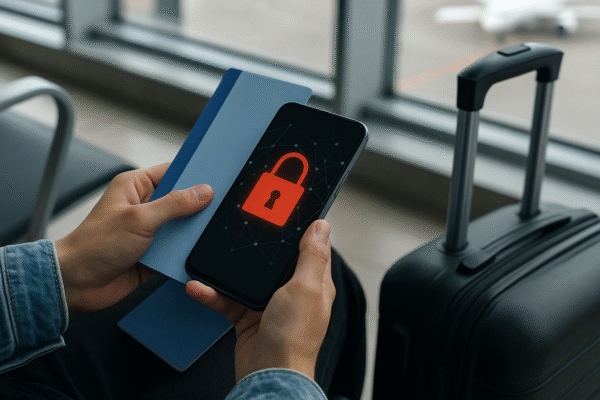In today’s digitized tourism world, every flight reservation, hotel check-in, and online payment leaves a digital footprint—making travellers more connected than ever, but also more exposed. The travel sector, once defined by seamless journeys, now faces escalating threats to privacy and trust. From airlines and hotels to visa services and third-party apps, data breaches are emerging as a central challenge reshaping the future of travel security.
Airlines Grapple with Rising Digital Risks
Air carriers are prime targets for cybercriminals due to the immense troves of personal data they store—including frequent flyer profiles, contact details, travel histories, and sometimes government document information. Recently, a prominent Dutch airline suffered a breach affecting around six million passengers, exposing names, email addresses, birth dates, and loyalty program details. Fortunately, financial and passport data remained safe, but the scope highlights persistent vulnerabilities in airline ecosystems.
Moreover, authorities have raised alarms about the hacker group known as “Scattered Spider” targeting airlines through sophisticated impersonation of staff and exploitation of vendor relationships. By infiltrating support desks or third-party systems, such groups can trigger data theft or system lockdowns—deepening the necessity for unified, enterprise-level IT defenses across the travel chain.
Even ancillary travel services aren’t immune. A UK luggage-handling platform used by multiple major airlines was found to have glaring security flaws that exposed highly sensitive user travel details—including boarding passes and passports—even for diplomats. These incidents underline that travellers’ security depends not just on airlines and hotels, but on each digital link in their travel journey.
Hotels: Digital Disruption Meets Guest Data Theft
Hotels, repositories of guest profiles, credit card details, and identity documentation, increasingly face ransomware and malware attacks. When systems go dark, the guest experience collapses: bookings fail, digital keys stop working, and loyalty points vanish. These disruptions go beyond stolen data—they translate into missed vacation time, guest frustration, and a breakdown in confidence.
Visa Providers: Pre-Trip Vulnerabilities
Visa application systems, often managed by third-party firms, collect some of the most sensitive personal information—passport scans, biometric identifiers, travel itineraries. Flaws or misconfigurations in these systems have exposed applicants’ data, raising the alarming possibility that a traveller’s privacy is at risk even before the journey begins.
Driving Forces Behind Increased Attacks
The travel industry’s digital transformation has widened the attack surface. With so many interconnected systems—from airline alliances and hotel chains to booking platforms and service providers—any breach can cascade across multiple brands and services. International security reports show that ransomware and data exfiltration are among the most common threats, with attackers monetizing stolen data or crippling systems to demand ransom.
Even though global average breach recovery costs have slightly declined thanks to AI-powered detection, the overall financial stakes remain high. In sectors where travel intersects with supply chains, a single breach can ripple through countless systems—amplifying both impact and cost.
The Human Cost of Digital Exposure
For travellers, the consequences of these breaches are deeply personal. Identity theft risks soar when stolen passports, birth dates, or contact information leak. Stolen loyalty points and reward accounts vanish without warning, turning anticipated perks into frustration. Meanwhile, systems failures leave travellers stranded at airports or hotels, with disrupted itineraries that linger far longer than any refund.
Another rising threat is personalized phishing attacks. When attackers know your travel schedule, they can craft all-too-plausible messages about itinerary changes or refunds—tempting travellers to click links that install malware or harvest credentials.
Even the recovery process isn’t always smooth. Guests may have to reset accounts, navigate multi-factor security, or cancel impacted passports—often feeling the tension between convenience and protection.
Empowering Travellers with Privacy-Aware Habits
Despite growing threats, travellers can take proactive steps to reduce risk. Using unique and strong passwords—ideally managed by a password manager—combined with two-factor authentication, dramatically raises the bar for attackers. Minimizing the amount of personal documentation shared, especially in apps, and deleting stored data post-trip can reduce exposure.
Vigilance matters: always verify unexpected messages through official channels, and avoid connecting to unsecured networks. While VPNs offer added privacy layers, they’re not failsafe—sometimes disrupting travel apps or being blocked by banks. Travelers should balance their use carefully, prioritizing convenience when necessary.
In case of breach alerts, reacting swiftly—changing credentials, freezing accounts, and monitoring financial activity—can limit damage. If travel documents like passports are affected, notifying authorities promptly is crucial.
Industry Responsibility and Transparent Crisis Response
Protecting traveller data isn’t just an individual task—it’s an industry imperative. Travel brands must adopt zero-trust security, enforce multi-factor authentication, limit the retention of personal data, and rigorously vet third-party vendors. When breaches occur, clear and timely communication, along with remedial measures such as free rebooking or fee waivers, help retain customer trust.
Finally, regulatory authorities are stepping in. Recent data incidents have led to heavy fines and settlements, reinforcing that weak security is not only risky—it’s costly. The real penalty, however, is reputational damage in an industry built on confidence.
Trust Is the New Currency of Travel
Travel once thrived on trust—trust in safe flights, secure stays, and protected itineraries. But data breaches are shattering that confidence. As data privacy climbs the traveller agenda, the industry face a pivotal moment. Protecting personal data isn’t optional—it’s foundational. Travel and digital safety must now travel hand in hand, so visitors can explore the world without compromising privacy or peace of mind.


















